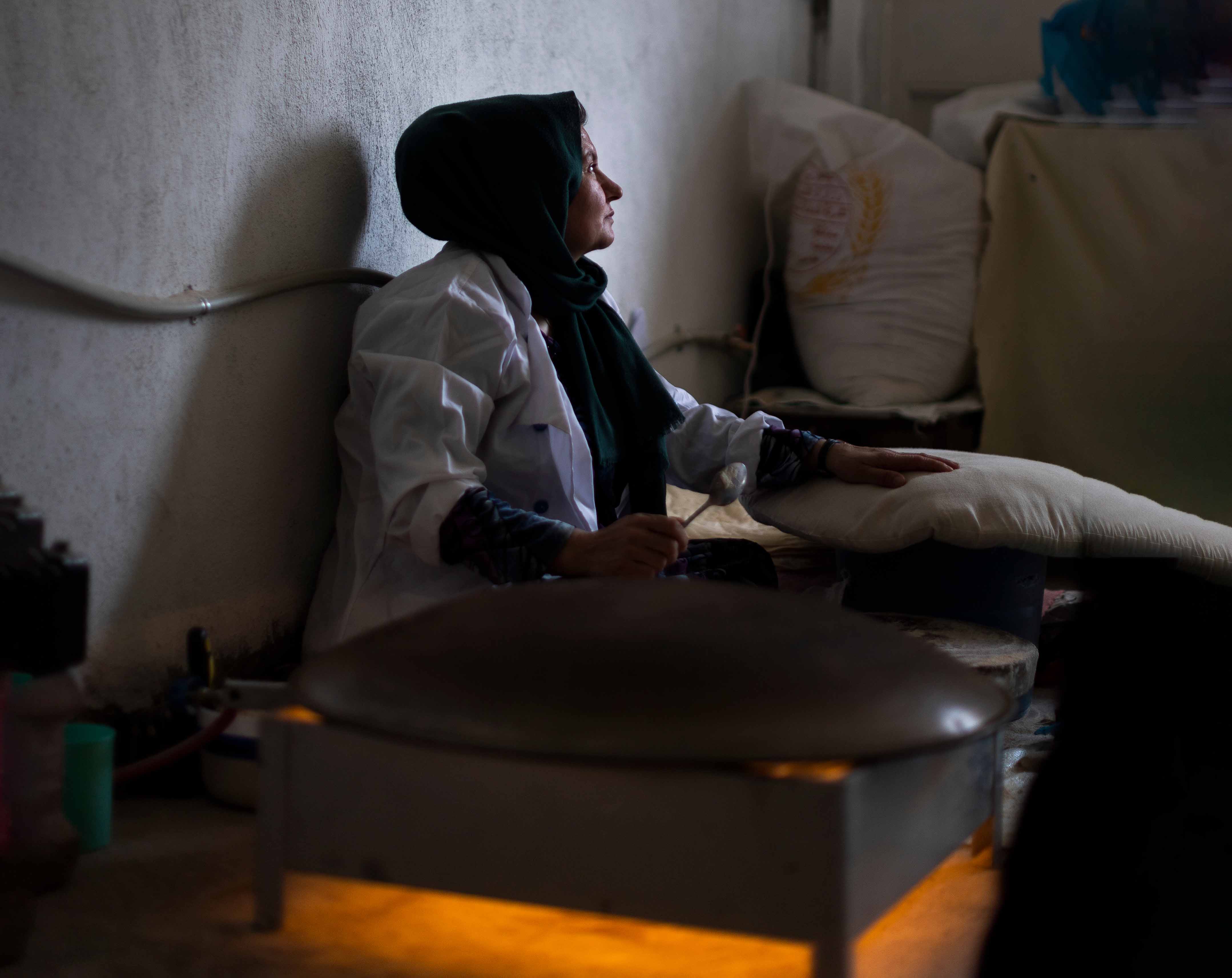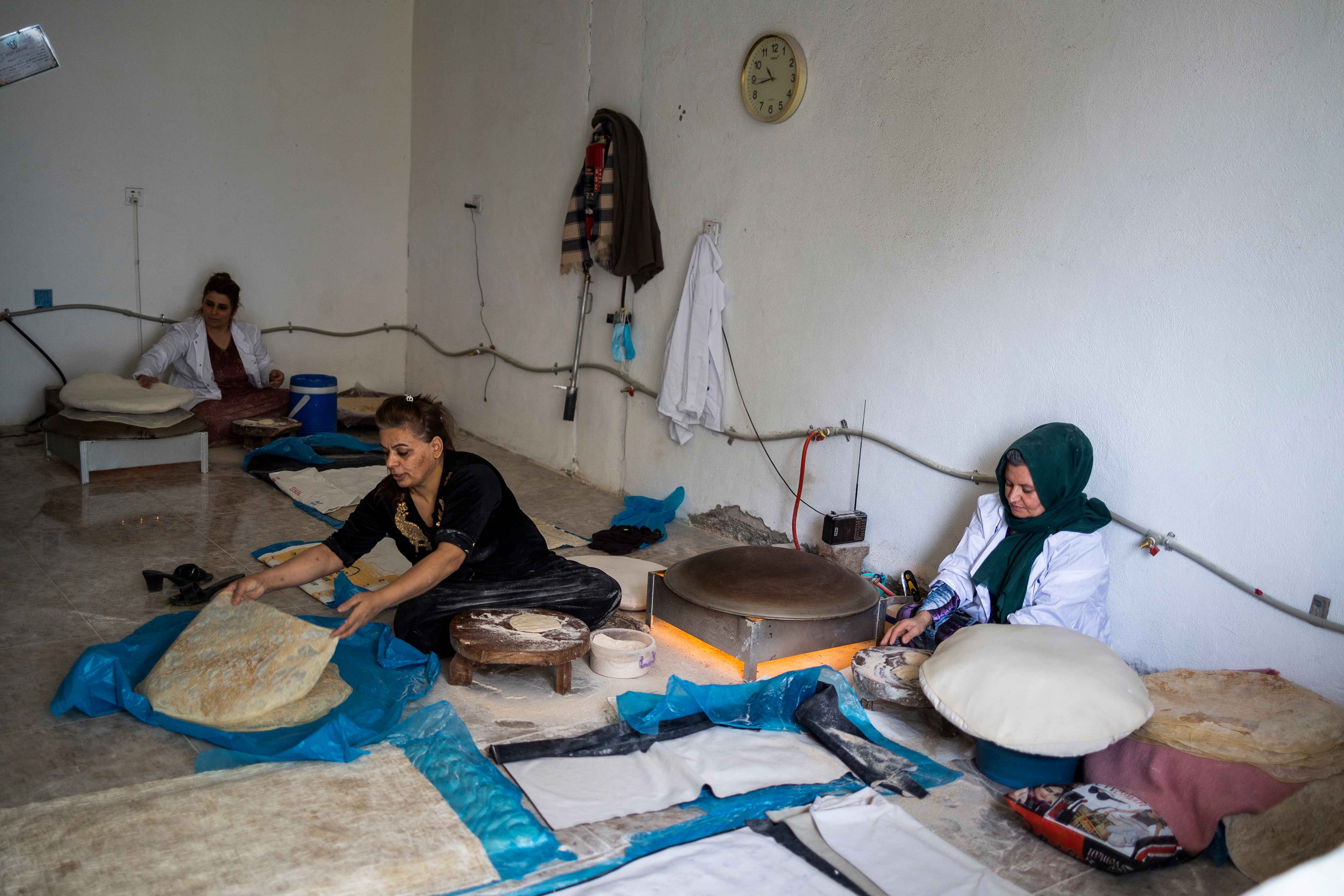Mounds of dough rise on the floor surrounding Kalle Huseein, the owner of Kalle Bakery who recently received a $7,000 EDF grant. Kalle used the money to enhance the business: painting the walls and installing new gas pipes that made it easier for workers to access the stoves they use to bake Hawrami bread.

From her pallet on the floor, Kalle tosses each fist-sized dough ball from hand to hand until it flattens out into a soft disk. Behind her, Nyan Gabar sprinkles green onions into a piece of Hawrami bread and folds it in half to cook while Tavga Osman, 48, stretches her dough out across a special pillow used to expand it. Cooking the bread takes only a few seconds. The pillow is flipped atop a hot metal disk. Bubbles rise. The dough crackles and puffs, and then one of the women grabs it by the far corner, pulls it toward her in a sweeping motion, and deposits the finished bread into a neat pile, ready to be sold.
These women have been working together six days a week, twelve hours a day since Kalle opened the business seven years ago.

Back then, Kalle’s husband was in the Kurdish branch of the Iraqi military called the Peshmerga. The bakery was a small operation at first, but as word spread quickly about the high quality and competitive prices of the bread, orders picked up.
Initially, Kalle’s contribution from the bakery was only supplementing her husband’s income, but that changed in 2014 after Kalle’s husband was sent out as the second wave of a mission, following a crew of his Peshmerga team members who were searching for an ISIL hideout in Jalawla. He came upon the bodies of all of his colleagues, who had been brutally killed by ISIL fighters. Coming home from that mission uninjured but in shock, Kalle said her husband couldn’t get out of bed, let alone continue working. So she became the sole financial support for their family of five until eventually, her husband’s heart gave out four years later, in 2018.

“She’s so good,” said Kalle’s daughter Binay Naqzad, 21, “She’s so strong. She praises God and she isn’t tired of life.”
Binay has spent the past several years working with her mother at the bakery when she wasn’t busy studying engineering at a nearby university. Her brother, Binar, 17, also helps when he isn’t in school. Kalle’s youngest daughter, Byra, 9, comes to the bakery everyday before leaving for school alongside Nyan’s daughter Laya, 8.
The little girls hold hands as they stroll down the cobbled streets, and Byra always stops by the bakery to give her mother a hug and a kiss.

Halabja has distinctive, striking scenery that’s set apart from the sand-washed southern regions of Iraq. Apartment windows overlook narrow streets that are set inside rolling hills.
But below the surface of its beauty, Halabja is still recovering from a 1988 chemical attack that killed somewhere between 3,000 and 5,000 people.
Tavga continued making bread as she spoke about being 12 years old when the weapons were dropped. She barely remembers what happened that day, but she knows that her family hid in a basement. And though she’s grateful she didn’t lose any family members, her parents suffered varying degrees of blindness and heart problems in the years since the attacks— both long term effects of chemical exposure. Tavga is now their primary caregiver.

Outside of work, Kalle, Tavga, and Nyan treat each other like family. Kalle’s home has one bedroom for her and her three kids—the same room where they watched their father’s health deteriorate until he died—but they’ve found ways to make new memories and to restore their comfort inside the space. Years ago, on nights when Nyan’s husband was away working as a police officer, she and her three children would go to Kalle’s and pile in with their family for sleepovers. “We didn’t have a penny to spend,” Kalle said, “but we were happy.” Between the six kids and their two mothers, the house felt full and alive.
Kalle and Nyan both hope to give their children the kinds of opportunities they didn’t have.
“My mother is always by my side,” said Nyan’s oldest son, Shkar, 19. “She’s working for us. She does this so we can have more.”



